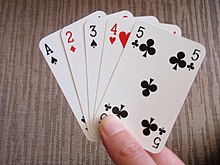
A wild card in card games is one that may be used to represent any other playing card, sometimes with certain restrictions. Jokers are often used as wild cards, but other cards may be designated as wild by the rules or by agreement. In addition to their use in card games played with a standard pack, wild cards may also exist in dedicated deck card games, such as the 'Master' card in Lexicon.

A stripped deck or short deck (US), short pack or shortened pack (UK), is a set of playing cards reduced in size from a full pack or deck by the removal of a certain card or cards. The removed cards are usually pip cards, but can also be court cards or Tarot cards. Many card games use stripped decks, and stripped decks for popular games are commercially available.
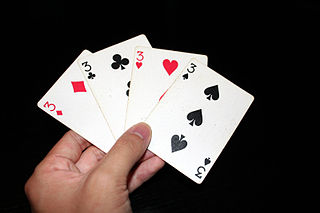
Gin rummy, or simply gin, is a two-player card game variant of rummy. It has enjoyed widespread popularity as both a social and a gambling game, especially during the mid twentieth century, and remains today one of the most widely-played two-player card games.
In poker, the probability of each type of 5-card hand can be computed by calculating the proportion of hands of that type among all possible hands.
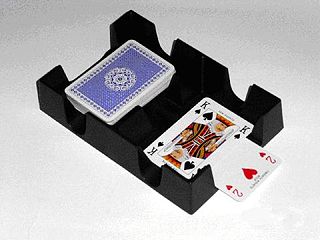
Canasta is a card game of the rummy family of games believed to be a variant of 500 Rum. Although many variations exist for two, three, five or six players, it is most commonly played by four in two partnerships with two standard decks of cards. Players attempt to make melds of seven cards of the same rank and "go out" by playing all cards in their hands. It is "the most recent card game to have achieved worldwide status as a classic".
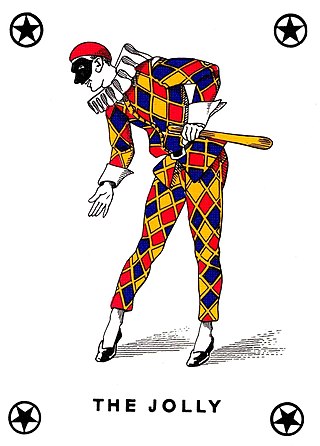
The Joker is a playing card found in most modern French-suited card decks, as an addition to the standard four suits. Since the second half of the 20th century, they have also been found in Spanish- and Italian-suited decks, excluding stripped decks.

Brag is an 18th century British card game, and the British national representative of the vying or "bluffing" family of gambling games. It is a descendant of the Elizabethan game of Primero and one of the several ancestors to poker, the modern version just varying in betting style and hand rankings. It has been described as the "longest-standing British representative of the Poker family."

Rummy is a group of games related by the feature of matching cards of the same rank or sequence and same suit. The basic goal in any form of rummy is to build melds which can be either sets or runs and either be first to go out or to amass more points than the opposition.

In card games, a meld is a set of matching cards, typically three or more, that earn a player points and/or allow them to deplete their hand. Melds typically come in sequences of ascending cards belonging to the same suit known as runs or sets/groups of cards of identical rank. Other ones may be marriage and bezique.

Conquian, Coon Can or Colonel is a rummy-style card game. David Parlett describes it as an ancestor to all modern rummy games, and a kind of proto-gin rummy. Before the appearance of gin rummy, it was described as "an excellent game for two players, quite different from any other in its principles and requiring very close attention and a good memory to play it well".

Klaberjass or Bela is a trick-taking Ace-Ten card game that is most popular in German communities. In its basic form it is a 9-card trick-and-draw game for two players using a 32-card piquet pack.

The Jass group, also known as the Jack–Nine card games, form a family of trick-taking games in which the jack (jass) and nine (manille) of the trump suit are the highest-ranking trumps, and the tens and aces of all suits are the next most valuable cards. Games in this family are typically played by 2 or 4 players with 32 French-suited cards.

The following is a glossary of terms used in card games. Besides the terms listed here, there are thousands of common and uncommon slang terms. Terms in this glossary should not be game-specific, but apply to a wide range of card games played with non-proprietary packs. It should not include terms solely related to casino or banking games. For glossaries that relate primarily to one game or family of similar games, see Game-specific glossaries.

German Rummy or Rommé is the most popular form of the worldwide game, Rummy, played in Austria and Germany. It is a game for 2 to 6 players and is played with two packs of French playing cards, each comprising 52 cards and 3 jokers. There are no partnerships. In Germany, the Germany Rummy Association is the umbrella organisation for local rummy clubs and organises national competitions. The game is often just known as Rommé in Germany and Rummy in Austria.
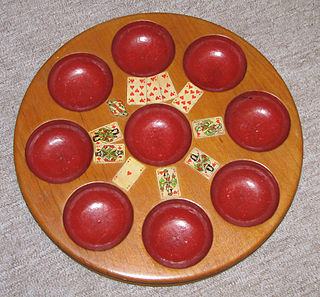
Poch, Pochen or Pochspiel is a very old card game that is considered one of the forerunners of poker, a game that developed in America in the 19th century. An etymological relationship between the game names is also assumed. Games related to Poch are the French Glic and Nain Jaune and the English Pope Joan. Other forerunners of poker and possible relatives of the game are the English game, Brag, from the 16th century and the French Brelan and Belle, Flux et Trente-et-Un. Poch is recorded as early as 1441 in Strasbourg. In north Germany it was called by the Low German name of Puchen or Puchspill, and the board was a Puchbrett.

Treppenrommé is a card game for two to four players, which is a variant of Rummy played in Germany and Austria. The name means "Staircase Rummy" and comes from the fact that the discard pile must be arranged such that every card is partly covered and partly visible, forming a so-called 'staircase' (Treppe). The game appears to be closely related to 500 Rum, but there are several differences.
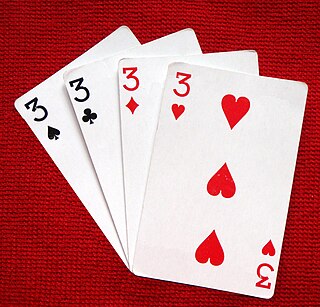
A set or group in card games is a scoring combination consisting of three or more playing cards of the same rank; in some games, such as Bieten, a set may also comprise just two cards.

An Ace-Ten game is a type of card game, highly popular in Europe, in which the Aces and Tens are of particularly high value.
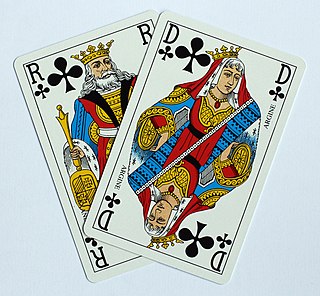
Briscan is an 18th-century, French Ace-Ten card game for two players played with a 32-card Piquet pack. It is a member of the Marriage group of games in which the 'marriage' of a King and Queen brings a bonus score, but Briscan takes this simple concept to extraordinary lengths.
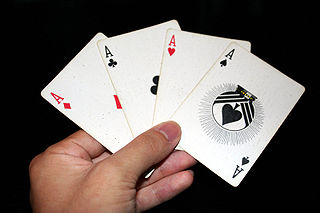
Romestecq is an historical Dutch card game for two, four or six players in two teams that dates to at least the 17th century. It was also popular in France for over a century. Despite being criticised in contemporary sources as "complicated" it continued to appear in the literature until the end of the 19th century and was sufficiently interesting for it to appear in The Penguin Book of Card Games in 2008.
